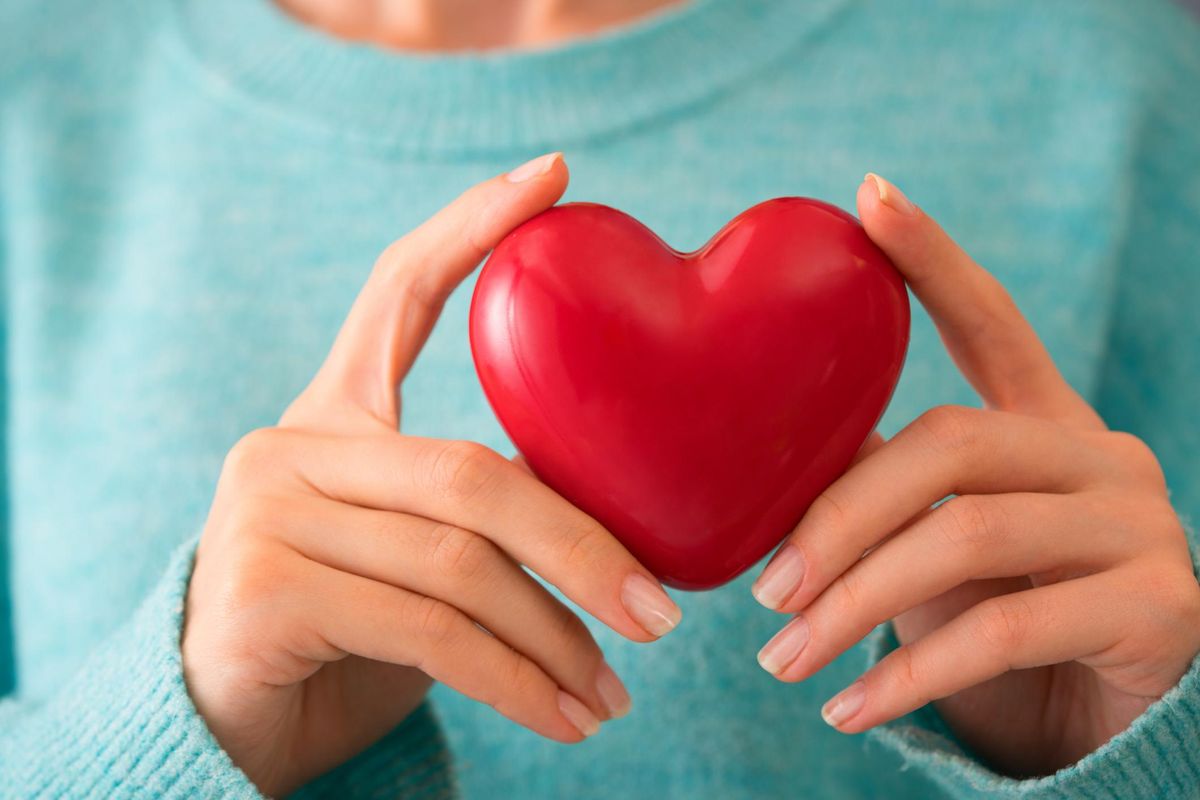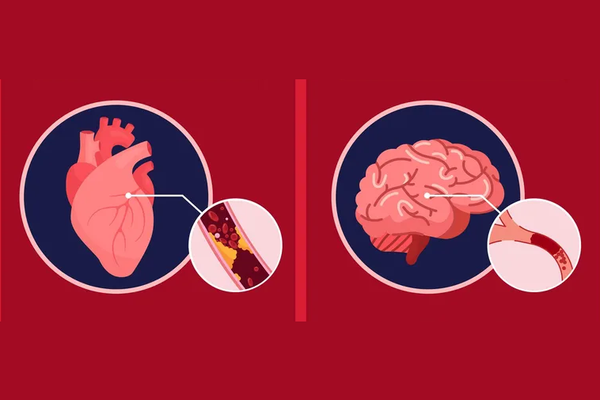Heart disease is the leading cause of death among women in the United States, accounting for 1 in 3 deaths. Yet, less than half of women recognize that heart disease is their number one killer. Heart disease — including coronary artery disease, myocardial infarction (also known as heart attack) and heart failure — can result in serious illness and disability and can contribute to cognitive decline as well as decreased quality of life.
HealthyWomen reached out to cardiologist Nieca Goldberg, M.D. to answer questions that will help you be better informed about cardiovascular disease (CVD). Goldberg is the medical director of the Women's Heart Program and senior advisor for women's health strategy at NYU Langone Health and a member of HealthyWomen's Women's Health Advisory Council.
How do I know if I’m at risk for heart disease?
Heart disease is a general term that refers to the heart muscle, heart valves, heart rhythm and arteries that supply the heart muscle. To learn if you are at risk for a heart disease, consider:
Family history — A mom, dad or sibling with a history of coronary artery disease or heart attack may increase your risk. Heart arrhythmias can also run in families, and you should be evaluated by a heart rhythm specialist if a family member died suddenly of a heart arrhythmia. Some heart muscle disorders, known as cardiomyopathies, also may run in families.
Laboratory testing — A blood test to measure cholesterol and glucose levels will help you assess risk for coronary artery disease.
Exam — See your healthcare provider (HCP) to check weight and blood pressure. High blood pressure and obesity increase your risk for coronary artery disease. If you smoke, quit. Cigarette smoking can increase your heart attack risk. An inactive lifestyle also increases your risk for heart disease.
What are the symptoms of heart disease (Including heart attack, arrhythmia and heart failure)?
Heart disease may not cause symptoms and may be "silent." Sometimes, heart disease is diagnosed when a person experiences signs of a heart attack, heart failure or arrhythmia.
Heart attack: Symptoms of heart attacks are sudden and can occur when you're resting or awaken you from sleep. You may feel tightness or pressure in the chest radiating to the arm, neck or jaw. Heart attacks may be associated with nausea, breaking out into a cold sweat or having shortness of breath (as if you just ran a marathon).
The chest pain can be on the left, right, mid-chest or low-chest. Don't get caught up in the location; get to the hospital. Often, lower chest tightness or pressure is mistaken for stomach issues. Other symptoms are upper back tightness and pressure, fainting, and extreme fatigue.
Heart failure: Heart failure is associated with shortness of breath, leg swelling, inability to lie flat because of shortness of breath and decreased physical endurance, meaning your body is unable to do activity for a long period of time.
Arrhythmia: The symptoms of arrhythmia include rapid, skipped or fluttering heart beats; fainting; near fainting; and lightheadedness.
Do I have control over risk factors related to heart disease?
Some risk factors for heart disease cannot be controlled, such as family history, but there are many you can control. You can take steps to lower your risk for heart disease by learning about and changing the factors you can manage, such as diet and nutrition.
How do diet and nutrition affect my heart? What is the best food plan for heart health?
Diets high in saturated fat raise LDL or "bad" cholesterol. Diets high in sugar and starches raise blood sugar levels. A Mediterranean-style diet is a heart-healthy diet that reduces risk factors such as obesity, diabetes, high blood pressure and high cholesterol.
How does exercise help my heart? What is the best kind of exercise for heart health?
Exercise lowers your risk of heart disease by decreasing blood pressure, increasing HDL (good) cholesterol and relaxing blood vessels, and improving blood flow to your exercising muscles. Exercise can also reduce stress. Adding at least half an hour of aerobic (or "cardio") exercise to your day benefits heart health by getting your heart rate up and improving fitness through cardiovascular activities, such as running, swimming and cycling. Weight training helps to reduce body fat and strengthen muscles used in aerobic exercise.
Are blood sugar levels the same as glucose levels? And is diabetes related to heart health?
Yes, blood sugar levels are the same as glucose levels. When your blood glucose is too high, diabetes can occur. Diabetes is a major risk factor for heart disease. People with diabetes are more likely to have certain risk factors, such as high cholesterol or high blood pressure, that increase their chances of having a heart attack.
What is the link between heart disease and conditions such as high blood pressure, high cholesterol and obesity?
High blood pressure, high cholesterol and obesity increase risk for coronary artery disease and heart attack. High blood pressure increases heart attack risk because it causes strain on the heart muscle and that leads to buildup of fat and other substances in the walls of the arteries, narrowing the coronary arteries. This process is known as coronary artery disease, which is what causes heart attacks. High blood pressure causes your arteries to be less elastic, which decreases blood and oxygen flow to the heart, leading to heart disease.
When your cholesterol is too high, it clings to the walls of your arteries, eventually clogging them. Narrowed arteries decrease blood flow to the heart, resulting in angina (chest pain) or heart attack. The extra weight associated with obesity forces the heart to do more work. Individuals with obesity need more blood to supply their bodies with oxygen and nutrients, causing blood pressure to rise.
Obesity can raise blood pressure, increase levels of LDL (bad) cholesterol and triglycerides, and lower HDL (good) cholesterol. It can also lower our cells' sensitivity to glucose and make it harder to metabolize glucose, which can lead to prediabetes and diabetes.
What are heart issues during pregnancy and how can these issues affect my heart later in life?
During pregnancy, the heart pumps 30% to 50% more blood than usual each minute to nourish your growing baby. Pregnancy causes an increase in heart rate, as well as stress to your heart and circulatory system. During labor and delivery, your body endures sudden changes in blood flow and pressure. It might take several weeks after delivery for your heart to return to its pre-pregnancy levels. Pregnant women with health complications such as high blood pressure and gestational diabetes face a higher risk of cardiovascular disease later in life.
How often should I get my cholesterol checked?
You should have your cholesterol checked yearly, or as often as your HCP suggests. You may need more-frequent testing if you have high cholesterol and are being treated with either diet and exercise or a combination of diet, exercise and medication.
This resource has been created with support from Amgen, Bristol Myers Squibb & Novartis.
- Clinically Speaking: Questions to Ask Your Healthcare Provider ... ›
- What Is Heart Disease? - HealthyWomen ›
- My Cardiovascular Disease Taught Me How to Live - HealthyWomen ›
- Heart Disease: What Women Don’t Know - HealthyWomen ›
- 4 Reasons Women Should Learn About Coronary Artery Disease - HealthyWomen ›
- Are You at Risk for Heart Disease? - HealthyWomen ›
- Facts About Heart Valve Disease - HealthyWomen ›
- What Women Need to Know About Cardiovascular Disease - HealthyWomen ›
- How Pregnancy Can Affect Your Heart Health - HealthyWomen ›
- What Women Need to Know About Heart Disease - HealthyWomen ›
- Lo que debes saber de la insuficiencia cardiaca - HealthyWomen ›
- List of heart disease resources - HealthyWomen ›







